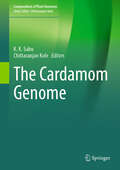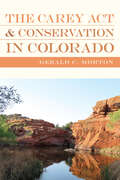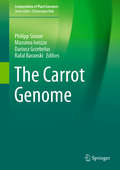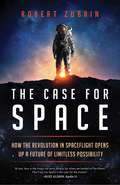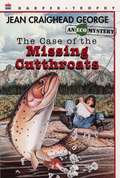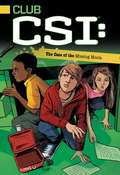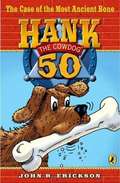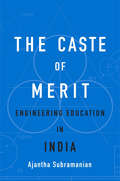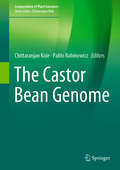- Table View
- List View
The Cardamom Genome (Compendium of Plant Genomes)
by Chittaranjan Kole K. K. SabuThis book is the first comprehensive compilation of elucidation of the genome of cardamom (Elettaria cardamomum Maton) and its genetic improvement. It includes reviews on the genetic resources, genetics and breeding and in vitro culture in cardamom and molecular characterization of phylogenetic relationship of cardamom of Columbia and Costa Rica. This book presents deliberations on the whole genome sequencing and SSR markers of small cardamom. It also enumerates on the genetics and genomics of biotic stress and host-pathogen interaction, genomics of flavors, and transcriptomics resources and their implications and finally functional regulation of mRNAs in cardamom. Altogether, the book contains about 150 pages over 10 chapters authored by globally reputed experts on the relevant field in this crop. The book is useful to the students, teachers, and scientists in the academia and relevant private companies interested in classical genetics and breeding, molecular genetics, structural genomics, functional genomics, plant pathology and plant physiology of cardamom.
The Cardinal of the Kremlin: An electrifying Jack Ryan thriller that will have your heart racing (Jack Ryan #3)
by Tom Clancy'The best of the Jack Ryan series!' New York TimesThe superpower arms negotiations appear to be making progress. But a US spy satellite reveals that the Soviets are building a massive laser-defence system controlled from an other-worldly array of pillars and domes in the Soviet hills at Dushanbe near the border of war-torn Afghanistan.The Americans need more information. The man to give it is Colonel Mikhail Filitov of the Soviet Union, codename Cardinal, America's highest-placed agent in the Kremlin. But Filitov's cover is about to be betrayed to the KGB, and CIA adviser Jack Ryan must rescue Filitov and bring him to safety . . .
The Caretaker Trilogy, Book 1: Firestorm
by David KlassThe face of death watching me. Constantly being chased and tracked, by a nameless, faceless army. Can't trust anyone . . . His mother is not his mother. His father is not his father. And if he hadn't broken the high school rushing record that night, nothing would have changed. He'd just be going out for pizza, playing football, trying yet again to score with his girl friend, P.J. But he did break the record. He appeared on the news. And now they have found him. Ripped from the only world he's ever known, Jack plunges into a space-timebending game of survival with no way out. The rules are shrouded in secrets they say he can't handle. But some things he learns fast: Trust no one. Never forget that your friends could reveal themselves as your enemies at any second. Every turn leads to a betrayal. And if you don't go along with it, you die. After centuries of abuse, the earth is dying, and it's up to Jack to reverse the decline before the Turning Point, when nothing will ever be the same again. Beaten into shape by a ninja babe and a huge, shaggy, telepathic man's best friend, Jack hurtles across the ocean to save the future from the present and to solve the mystery of his purpose. Exactly who, or what, is Firestorm, and what does it have to do with Jack? And what comes next when everything you have ever known turns out to be wrong? In the first book of the Caretaker Trilogy, David Klass has created a thrilling world where nothing is as it seems. Firestorm is an electrifying adventure of hunting truth and raging hormones, all in the name of staying alive.
The Caretaker Trilogy, Book 2: Whirlwind
by David KlassIn Firestorm, the first book of the Caretaker Trilogy, seventeen-year-old Jack Danielson saved the world's oceans, but at great personal cost-his parents were killed and everything he knew and believed was turned upside down. Now Jack has come home to see P.J., his girlfriend and sole remaining touchstone. But she's missing, and blame falls on Jack. On the run with Gisco, his crafty canine sidekick, Jack is literally caught up in a whirlwind as he travels to the heart of darkness to rescue P.J.-a journey that will bring him face-to-face with the father of his old nemesis, the Dark Lord from the future, as well as a beautiful and mysterious ally. Jack's quest becomes all the more complicated as he discovers that the only person who can stop the Dark Lord is another time traveler, one who has become lost in the present. Searching him out, Jack encounters almost unendurable horrors, learns to appreciate the savage beauty of the rain forest, and is forced to confront shocking truths about himself and the people he loves. David Klass mixes heart-racing adventure with an urgent ecological warning about the fragility of the world's rain forests and the importance of respect for indigenous peoples.
The Caretaker Trilogy, Book 3: Timelock
by David KlassJack discovers that the only way to protect the Earth from ecological disaster at the hands of the Dark Army is to lock time, and he must choose between staying in the present or returning to the future world from which he came.
The Carey Act and Conservation in Colorado
by Gerald C. MortonThe Carey Act and Conservation in Colorado is an environmental history of the endless missteps and unforeseen consequences that characterized Colorado’s participation in the Carey Act—an 1894 federal law that granted one million acres of desert-classified public land to each western state for private irrigation development and settlement. In this inclusive narrative, author Gerald Morton reveals how this obscure law affected thirty-four of Colorado’s most arid stretches of landscape. Morton contextualizes the Carey Act’s significance in Colorado through a study of the Two Buttes and Muddy Creek projects in the state’s southeastern corner—tragic examples of the disconnect among developers seeking windfall profits in the face of financial rollercoasters, the challenge of reclaiming remote sagebrush country, and settlers seeking viable livelihoods that eventually led conservationists to reimagine the failures as public wildlife refuges. A collision of values between developers and settlers lay at the center of those wildlife habitat conservation efforts, forcing people to rethink their relationship with the land and ephemeral streams—an awareness that correlated with the advent of modern ecology. The Carey Act and Conservation in Colorado is the untold story of the manipulation of nature and the reconceived use of land for public wildlife areas on the southern plains of the American West. Offering original research on arid lands policy, federal and state agency oversight, irrigation bond financing, heartbroken settlers’ grievances, individual developers’ motives, and the rise of wildlife conservation, this compelling tale of misfortune will appeal to scholars and general readers interested in conservationist and environmental history in the American West.
The Carrier
by Mattias BergThe man with the nuclear briefcase has gone rogue - Mission Impossible meets the Hunt for Red October "What should a thriller do to rise above the ranks of the clichéd? It does no harm to demonstrate some intelligence and (if possible) an engagement with serious issues - but no polemics. Thankfully, Mattias Berg's The Carrier hits those targets squarely" Barry Forshaw, Financial Times"Enjoyable, ingenious . . . packed with fascinatingly arcane nuclear facts" Myles McWeeney, Irish IndependentErasmus Levine has a job like no other He travels with the President of the United States at all times, and holds in his hands the power to obliterate life as we know it. He is the man with the nuclear briefcase, part of a crack team of top-secret operatives established after 9/11, led by a man codenamed Edelweiss. But not even Edelweiss is party to the identity of their ultimate authority, known only as Alpha.Erasmus Levine has a secretFor years he has been receiving cryptic messages from Alpha, an elaborate communication that began with the words we two against the world. Levine begins thinking of escape: his chance comes during an official visit to Sweden, when the alarm sounds in Stockholm's Grand Hotel.But Alpha has other plansFrom their first meeting in a network of tunnels and bunkers beneath the city, Levine is drawn into a plan to eliminate the world's nuclear arsenals. But is controlled demolition really the endgame? Could he be working towards a controlled apocalypse, a doomsday plot to wipe humanity from the face of the earth?Translated from the Swedish by George Goulding
The Carrier
by Mattias BergThe man with the nuclear briefcase has gone rogue - Mission Impossible meets the Hunt for Red October"What should a thriller do to rise above the ranks of the clichéd? It does no harm to demonstrate some intelligence and (if possible) an engagement with serious issues - but no polemics. Thankfully, Mattias Berg's The Carrier hits those targets squarely" Barry Forshaw, Financial Times"Enjoyable, ingenious . . . packed with fascinatingly arcane nuclear facts" Myles McWeeney, Irish IndependentErasmus Levine has a job like no otherHe travels with the President of the United States at all times, and holds in his hands the power to obliterate life as we know it. He is the man with the nuclear briefcase, part of a crack team of top-secret operatives established after 9/11, led by a man codenamed Edelweiss. But not even Edelweiss is party to the identity of their ultimate authority, known only as Alpha.Erasmus Levine has a secretFor years he has been receiving cryptic messages from Alpha, an elaborate communication that began with the words we two against the world. Levine begins thinking of escape: his chance comes during an official visit to Sweden, when the alarm sounds in Stockholm's Grand Hotel.But Alpha has other plansFrom their first meeting in a network of tunnels and bunkers beneath the city, Levine is drawn into a plan to eliminate the world's nuclear arsenals. But is controlled demolition really the endgame? Could he be working towards a controlled apocalypse, a doomsday plot to wipe humanity from the face of the earth?Translated from the Swedish by George Goulding
The Carrot Genome (Compendium of Plant Genomes)
by Philipp Simon Massimo Iorizzo Dariusz Grzebelus Rafal BaranskiThis book provides an up-to-date review and analysis of the carrot’s nuclear and organellar genome structure and evolution. In addition, it highlights applications of carrot genomic information to elucidate the carrot’s natural and agricultural history, reproductive biology, and the genetic basis of traits important in agriculture and human health. The carrot genome was sequenced in 2016, and its relatively small diploid genome, combined with the fact that it is the most complete root crop genome released to date and the first-ever Euasterid II genome to be sequenced, mean the carrot has an important role in the study of plant development and evolution. In addition, the carrot is among the top ten vegetables grown worldwide, and the abundant orange provitamin A carotenoids that account for its familiar orange color make it the richest crop source of vitamin A in the US diet, and in much of the world. This book includes the latest genetic maps, genetic tools and resources, and covers advances in genetic engineering that are relevant for plant breeders and biologists alike.
The Carrot Purple and other Curious Stories of the Food We Eat (Rowman & Littlefield Studies in Food and Gastronomy)
by Joel S. DenkerHow many otherwise well-educated readers know that the familiar orange carrot was once a novelty? It is a little more than 400 years old. Domesticated in Afghanistan in 900 AD, the purple carrot, in fact, was the dominant variety until Dutch gardeners bred the young upstart in the seventeenth century. After surveying paintings from this era in the Louvre and other museums, Dutch agronomist Otto Banga discovered this stunning transformation. <p><p>The story of the carrot is just one of the hidden tales this book recounts. Through portraits of a wide range of foods we eat and love, from artichokes to strawberries, The Carrot Purple traces the path of foods from obscurity to familiarity. Joel Denker explores how these edible plants were, in diverse settings, invested with new meaning. They acquired not only culinary significance but also ceremonial, medicinal, and economic importance. Foods were variously savored, revered, and reviled. <p><p>This entertaining history will enhance the reader’s appreciation of a wide array of foods we take for granted. From the carrot to the cabbage, from cinnamon to coffee, from the peanut to the pistachio, the plants, beans, nuts, and spices we eat have little-known stories that are unearthed and served here with relish.
The Cartographic State
by Jordan BranchWhy is today's world map filled with uniform states separated by linear boundaries? The answer to this question is central to our understanding of international politics, but the question is at the same time much more complex – and more revealing – than we might first think. This book examines the important but overlooked role played by cartography itself in the development of modern states. Drawing upon evidence from the history of cartography, peace treaties and political practices, the book reveals that early modern mapping dramatically altered key ideas and practices among both rulers and subjects, leading to the implementation of linear boundaries between states and centralized territorial rule within them. In his analysis of early modern innovations in the creation, distribution and use of maps, Branch explains how the relationship between mapping and the development of modern territories shapes our understanding of international politics today.
The Cartoon Guide to Algebra (Cartoon Guide Ser.)
by Larry GonickA comprehensive and comical new illustrated guide to algebraDo you think that a Cartesian plane is a luxury jetliner? Does the phrase "algebraic expression" leave you with a puzzled look? Do you believe that the Order of Operations is an Emmy-winning medical drama? Then you need The Cartoon Guide to Algebra to put you on the road to algebraic literacy.The Cartoon Guide to Algebra covers all of algebra's essentials—including rational and real numbers, the number line, variables, expressions, laws of combination, linear and quadratic equations, rates, proportion, and graphing—with clear, funny, and easy-to-understand illustrations, making algebra's many practical applications come alive. This latest math guide from New York Times bestselling author Larry Gonick is an essential supplement for students of all levels, in high school, college, and beyond. School's most dreaded subject has never been more fun.
The Case Against Perfection: Ethics in the Age of Genetic Engineering
by Michael J. SandelThe Case against Perfection explores these and other moral quandaries connected with the quest to perfect ourselves and our children. Michael Sandel argues that the pursuit of perfection is flawed for reasons that go beyond safety and fairness. The drive to enhance human nature through genetic technologies is objectionable because it represents a bid for mastery and dominion that fails to appreciate the gifted character of human powers and achievements. Carrying us beyond familiar terms of political discourse, this book contends that the genetic revolution will change the way philosophers discuss ethics and will force spiritual questions back onto the political agenda.
The Case for Space: How the Revolution in Spaceflight Opens Up a Future of Limitless Possibility
by Robert ZubrinA noted space expert explains the current revolution in spaceflight, where it leads, and why we need it.A new space race has begun. But the rivals in this case are not superpowers but competing entrepreneurs. These daring pioneers are creating a revolution in spaceflight that promises to transform the near future. Astronautical engineer Robert Zubrin spells out the potential of these new developments in an engrossing narrative that is visionary yet grounded by a deep understanding of the practical challenges.Fueled by the combined expertise of the old aerospace industry and the talents of Silicon Valley entrepreneurs, spaceflight is becoming cheaper. The new generation of space explorers has already achieved a major breakthrough by creating reusable rockets. Zubrin foresees more rapid innovation, including global travel from any point on Earth to another in an hour or less; orbital hotels; moon bases with incredible space observatories; human settlements on Mars, the asteroids, and the moons of the outer planets; and then, breaking all limits, pushing onward to the stars.Zubrin shows how projects that sound like science fiction can actually become reality. But beyond the how, he makes an even more compelling case for why we need to do this--to increase our knowledge of the universe, to make unforeseen discoveries on new frontiers, to harness the natural resources of other planets, to safeguard Earth from stray asteroids, to ensure the future of humanity by expanding beyond its home base, and to protect us from being catastrophically set against each other by the false belief that there isn't enough for all.
The Case of Missing Cutthroats: An Ecological Mystery
by Jean Craighead GeorgeThis mystery begins when Spinner, a New York City native who would rather pirouette than fly cast, catches the family prize--much to her boy cousins' dismay. The prize fish, a huge cutthroat trout, had been thought to be extinct in the river, and Spinner and her cousin set out to solve the mystery of how this one spectacular cutthroat survived until Spinner reeled him in.
The Case of Vampire Vivian (Science Solves It!)
by Michelle KnudsenSolve kid-sized dilemmas and mysteries with SCIENCE SOLVES IT! These fun science books for kids ages 5–8 blend clever stories with real-life science. Why did the dog turn green? Can you control a hiccup? Is that a UFO? Find the answers to these questions and more as kid characters dive into physical, life, and earth sciences. Watch out! The new girl in town, Vivian, wears a bat T-shirt and bat earrings. Suddenly, there are bats flying all around at night! Does she have something to do with them? Is she really a vampire? Books in this perfect STEM series will help kids think like scientists and get ahead in the classroom. Activities and experiments are included in every book!
The Case of the Disappearing Dogs
by David LewmanThe Club CSI: kids are counting on forensic science to find Hannah's missing dog!Hannah's dog Molly wins first place in the neighborhood dog show, but her family doesn't get to celebrate for very long. Soon after they return home, Molly goes missing! Hannah's parents are convinced that she left the back gate open by mistake, but Hannah knows she didn't. Her Club CSI: friends help investigate and find a crushed orange dog treat (Molly's treats are brown) and a piece of ripped red fabric that snagged on the back gate. Was Molly the victim of a dog-napping? If so, who took her and why? Club CSI: is on the case!
The Case of the Million Dollar Mystery (Jigsaw Jones Super Special #2)
by James PrellerThere's a contest in Jigsaw's school to come up with a prize-winning invention. The kids are convinced the prize is a million dollars and everyone wants to win. But someone sneaky is messing up the contest. Jigsaw and Mila may have to invent some super-sleuthing gadgets of their own to solve this million-dollar mystery.
The Case of the Missing Moola (Club CSI)
by David LewmanCrack a case with Club CSI: in this new middle-grade series about forensic science!Calling all kid crime-solvers: Forensic science isn't just for grown-ups anymore! Thanks to the popularity of shows like CSI: Crime Scene Investigation, forensic science has made its way into the classroom. This new middle-grade series stars a group of students whose forensic science class inspires them to form a "Club CSI:" to investigate crimes and capers at school. As Club CSI: collects clues, readers will love trying to put the pieces together to find out what really happened in this series that is part mystery, part detective story, and just plain fun!In Club CSI: Untitled #2, Ben, Corey, and Hannah will have to use all they've learned about forensic science--plus good old-fashioned detective work and a little bit of luck--to solve their next case! Inspired by the CSI franchise, Club CSI: is "required reading" for young scientists-in-training, or for anyone who loves a good mystery!
The Case of the Most Ancient Bone (Hank the Cowdog Series, #50)
by John R. EricksonHank the Cowdog Head of ranch security is on the case in his fiftieth mystery! And this is no ordinary, run-of-the-mill ranch intrigue. No sir, this is a real, honest-to-goodness archaeological adventure! when an old friend of Slim's starts an archaeological dig near the ranch, it doesn't take long before little Alfred gets caught up in the excitement. And once Alfred manages to get himself invited to the dig, it isn't long before Hank follows. once there, Hank finds himself face-to-face with the most ancient of bones a huge bison bone that Hank just knows has been aged to delicious perfection. Hank should be protecting the bone, but can he keep his doggie instincts at bay and uphold his position? or will the most ancient of bones get the best of him?
The Case of the Mystery Meat Loaf (Club CSI)
by David LewmanHow do you dust for fingerprints on a meat loaf? Club CSI: is on the case in this new middle-grade series about forensic science!Calling all kid crime-solvers: Forensic science isn't just for grown-ups anymore! Thanks to the popularity of shows like CSI: Crime Scene Investigation, forensic science has made its way into the classroom. This new middle-grade series stars a group of students whose forensic science class inspires them to form a "Club CSI:" to investigate crimes and capers at school. As Club CSI: collects clues, readers will love trying to put the pieces together to find out what really happened in this series that is part mystery, part detective story, and just plain fun!In The Case of the Mystery Meat Loaf, Ben, Corey, and Hannah's first case as Club CSI: begins when a bunch of students and the principal get food poisoning from the cafeteria's hot lunch. Everyone blames the new science teacher because she pushed the lunch lady to add her healthy "meatless meat loaf" recipe to the menu, but Club CSI: isn't pointing fingers until they evaluate the evidence. Can they find out who messed with the meat loaf before the science teacher gets in trouble or more people get sick? Club CSI: is on the case!
The Case of the Ruined Ram
by David LewmanThe Club CSI: kids team up to solve a crime of school spirit gone wrong.The students in Miss Hodges's forensic science class have been given a tough case to crack: The high school's Rocky the Ram mascot costume was stolen and destroyed! The class divides into teams to investigate, and the first team to solve the crime wins extra credit and gets VIP tickets to Rams games for the rest of the year! Corey, Hannah, and Ben quickly get to work. They discover that a very similar crime happened twenty-five years ago, and back then the rival high school confessed to the vandalism. Is this just a copycat prank? Or could someone else be to blame? Club CSI: is determined to be the first team to uncover the truth! © 2012 CBS & Ent. AB Funding LLC. CSI: Crime Scene Investigation in USA is a TM of CBS and outside US TM of Ent. AB Funding LLC.
The Caste of Merit: Engineering Education in India
by Ajantha SubramanianJust as Americans least disadvantaged by racism are most likely to call their country post‐racial, Indians who have benefited from upper-caste affiliation rush to declare their country a post‐caste meritocracy. Ajantha Subramanian challenges this belief, showing how the ideal of meritocracy serves the reproduction of inequality in Indian education.
The Casting Powders Book
by Kenneth C. Mills Carl-Åke DäckerThis book deals with casting powders and explains how they work and how they are best used to minimise defects in the ninety per-cent of world steel production that is continuously cast. The factors affecting various aspects of powder performance are described and different defects, their causes, and means of avoiding them are considered. Providing the first comprehensive coverage of mould powder properties and uses, the text treats theoretical and practical matters and gives direct advice on problem solving. Drawing on a wealth of scientific and technological research, represented by its extensive references, The Casting Powders Book shows readers how they can design and create mould powders optimised to fulfill the necessary functions of: lubrication of steel shells and reduction of shell-mould friction; absorption of inclusions floating up from the steel; chemical insulation of steel from carbon-rich mould powder; and protection of the steel meniscus from oxidation and thermal insulation to prevent surface freezing. Thermophysical properties and heat-transfer processes are also given detailed attention and case studies illustrate the methods and materials described. The Casting Powders Book is designed to be a periodic reference that can be dipped into as the need arises. Readers from different backgrounds are well-served by the depth and variety of content: engineers trouble-shooting a continuous-casting process interested in how mould fluxes can minimise defects and process problems and how their performance is in turn affected by casting parameters; academic scientists interested in the the theoretical aspects and properties of mould fluxes and slag films; or engineers working with ingot casting processes; and many others will find this book an invaluable resource.
The Castor Bean Genome (Compendium of Plant Genomes)
by Chittaranjan Kole Pablo RabinowiczThis book addresses various aspects of the current castor bean research, including genetics, biotechnology, comparative genomics, and more specific topics such as oil metabolism and the ricin toxin. It also presents the whole genome sequencing of the castor bean and its impact on the mining of gene families and future plant breeding. Castor bean (Ricinus communis), an oilseed plant, belongs to the Euphorbiaceae (spurge) family. It is a tropical and subtropical crop valued for the high quality and uniform nature of its oil, which is mostly composed of the uncommon fatty acid ricinoleate. Castor bean oil has important industrial applications for the production of lubricants, cosmetics, medicines, and specialty chemicals, and castor bean has also been proposed as a biodiesel crop that does not pose concerns regarding the “food versus fuel” debate. However, it accumulates the type 2 ribosome-inactivating protein ricin in its seeds, and health concerns posed by ricin’s high toxicity have prevented broader cultivation. Recently, there has been renewed interest in castor bean due to potential biosecurity issues.
